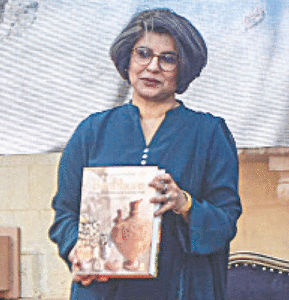KARACHI: The Holy Prophet (Peace Be Upon Him) established a welfare state and his approach to addressing social issues serves as an ideal governance model, not only for Muslim-majority nations, but also for countries across the globe.
This was highlighted by Prof Dr Zahid Ali Zahidi, dean of the Faculty of Islamic Studies at the Karachi University, in his keynote address on the theme “Guidelines for Muslim Rulers in the Light of the Prophet (PBUH)’s Seerat” of the monthly meeting of Shura Hamdard Karachi held the other day at the Hamdard Corporate Head Office.
The meeting was chaired by Ms Sadia Rashid, president of the Hamdard Foundation Pakistan (HFP).
Highlighting the exemplary governance at Madina, Dr Zahidi said the Holy Prophet (Peace Be Upon Him) established a welfare state, and his approach to addressing social issues served as an ideal governance model for the world.
He further said that a state plagued by lawlessness and internal rifts could never prosper. The Holy Prophet (PBUH) first established peace in the Arabian Peninsula, introduced ethical principles for warfare, and defined the rights and responsibilities of individuals within society.
Dr Zahidi said the Holy Prophet (PBUH) championed social justice, laid strong foundations for environmental preservation, and promoted knowledge and wisdom. Moreover, he reformed the Muslims by intellectually cultivating and educating his followers, igniting the thirst of knowledge in his companions. He instilled in them a sense of collectivism and strong ethical values, he said.
A good ruler, he emphasised, must possess at least those essential qualities to bring about holistic social reforms as needed in Pakistan.
Senator Abdul Haseeb Khan stated that Islam provided a complete way of life, and there was a need to fully follow the shining example of the Holy Prophet (PBUH). “Before blaming others, we should reflect on whether we are fulfilling our personal and national responsibilities. If injustice is happening and we remain silent due to our own interests, then we are also part of the injustice, as stated in the Holy Quran,” he said.
“Voting is a national and constitutional duty, but how many of us cast our votes with the nation’s best interest in mind, beyond personal biases?,” he asked and urged the need to connect the younger generation with the Holy Quran, encouraging them not to read it solely for spiritual reward, but to understand and live by its teachings and wisdom.
Zafar Iqbal said that the foundation of democracy lay in the charter of Madina and the Majlis-i-Shura. However, in Pakistan, those in power under the name of democracy often had interests that conflicted with the state’s well-being. He added that a true leader of a reformed nation should possess qualities such as faith, knowledge, action, piety, wisdom, insight, courage, sincerity, trustworthiness, honesty, integrity, and loyalty to the collective affairs of Muslims.
Dr Amir Tauseen explained that, according to a hadith of the Holy Prophet (PBUH), “we are all guardians and responsible for our actions. We are accountable to Allah for how we conduct ourselves in both social and worldly matters”.
He emphasised the importance of self-reflection, urged everyone to examine whether “we are being just in our families, relationships, dealings, and other social affairs. Do we have a genuine sense of responsibility?”
Dr Amjad Jafari stated that the Holy Prophet (PBUH) established an ideal state and a model society on earth through his excellent planning and management. The world still longed for such a stable society, he said.
Others who also shared their thoughts included Colonel (Rtd) Mukhtar Ahmad Butt, Usman Damohi, Shehla Ahmed, Prof Dr Tanveer Khalid, Engineer Ibnul Hasan, Syed Mohammad Arsalan and HFP director.
Sura Fatiha was recited for Quaid-i-Azam Muhammad Ali Jinnah on his death anniversary, observed on Sept 11.
The members also paid tribute to Shaheed-i-Pakistan Hakim Mohammed Said for his national services and prayed for the recovery of an ailing member, Shamim Kazmi. Mukhtar Butt moderated the discussion.
Published in Dawn, September 13th, 2024












































Dear visitor, the comments section is undergoing an overhaul and will return soon.